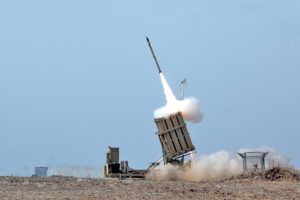The U.S. Army recently completed another live fire test with Israel’s Iron Dome system, successfully intercepting cruise missile and drone surrogate targets during the demonstration at White Sands Missile Range in New Mexico.
Moshe Patel, director of the Israeli Ministry of Defense’s missile defense organization (IMDO), noted in a statement this was the second interception test with Iron Dome since Israel delivered the two batteries of the capability to the U.S. Army in late 2020.

“In this test as well, the system intercepted all the threats, while being interoperable with US systems,” Patel said.
The U.S. Army acquired Iron Dome, produced by Israel’s Rafael, per a directive in the fiscal year 2019 defense authorization bill, with the goal for the system to serve as an interim cruise missile defense system while it continues pursuing a long-term solution, the Indirect Fire Protection Capability (IFPC) Increment 2.
A final decision has yet to be announced on where the U.S. Army plans to deploy its two Iron Dome batteries.
“Once again, the Iron Dome has proven its effectiveness and operational capabilities in combat scenarios. As part of the U.S. Army’s operational training, American troops operated the system which functioned with optimal effectiveness against a variety of threats and intercepted targets from different ranges,” Pini Yungman, head of Rafael’s Air & Missile Defense Directorate, said in a statement.
Maj. Gen. Brian Gibson, director of the U.S. Army’s Air and Missile Defense Cross-Functional Team, said the latest test with Iron Dome was another opportunity to ensure the system is able to integrate within the command and control architecture.
“It’s important to understand that implementation for the U.S. is about the ability to integrate this system into our air defense picture. We need to integrate this into our U.S. architecture, and to give confidence to our regional commanders that we can integrate this system safely into what they have,” Gibson said in a statement.
Last fall, the Army awarded the $237.4 million IFPC Inc. 2 prototype contract to Dynetics [LDOS] over a team of Rafael and Raytheon Technologies [RTX] offering a version of the Iron Dome system, after both competitors had participated in a live-fire “shoot-off” event earlier in 2021 (Defense Daily, Sept. 24 2021).
Maj. Gen. Robert Rasch, program executive officer for missiles, told reporters at the time that Dynetics’ Enduring Shield solution for IFPC Inc. 2 offered the “most advantageous and best value to the government.”
Dynetics is tasked with delivering 16 launchers and 60 interceptors under the IFPC Inc. 2 deal, with the Army planning to have the first operational battery of 12 launchers available by late FY ‘23 (Defense Daily, Sept. 27 2021).
Army officials have previously said a decision on whether to move ahead with a production contract covering 400 launchers is likely to be made in 2023.
Gen. Eric Smith, assistant commandant of the Marine Corps, said last month he is confident the service can move ahead with procurement of the Medium-Range Intercept Capability, which incorporates components of Israel’s Iron Dome, following two successful live fire tests with a prototype of the capability (Defense Daily, July 21).